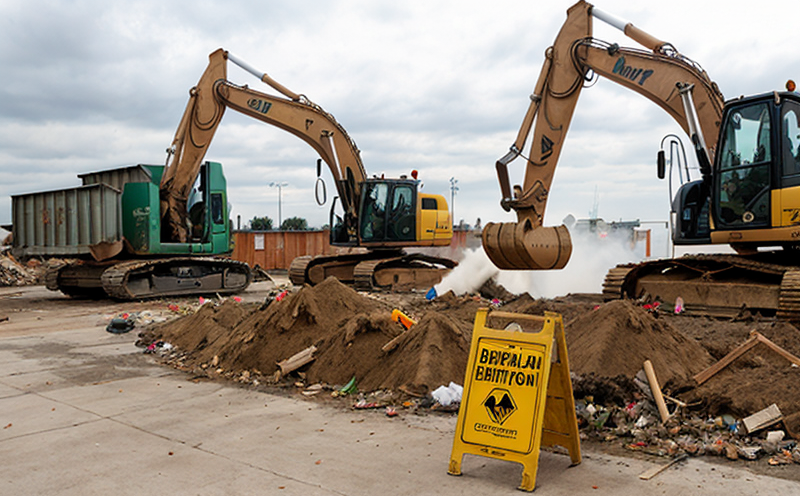EN 13242 Aggregates for Unbound and Hydraulically Bound Materials from C&D Waste
The European Standard EN 13242 provides a comprehensive framework for the production of aggregates intended for use in unbound and hydraulically bound materials derived from construction and demolition (C&D) waste. This service ensures that recycled aggregates meet stringent quality criteria, thereby supporting sustainable infrastructure development.
Recycling C&D waste into aggregates is increasingly recognized as an environmentally responsible practice. By reusing these materials, we reduce landfill pressure and decrease the demand for virgin raw materials like natural stone or sand. The standard specifies detailed procedures for processing, testing, and certifying recycled aggregates to ensure they are suitable for various applications.
The testing process under EN 13242 involves several key steps. Initially, waste material is sorted into different fractions based on particle size and composition. After sorting, the aggregates undergo a series of tests aimed at evaluating their physical properties, including particle size distribution, density, water absorption, and abrasion resistance. These tests are crucial for determining the suitability of recycled materials in various construction applications.
The standard also emphasizes the importance of chemical analysis to ensure that recycled aggregates do not contain harmful substances that could compromise the integrity of the final product or pose environmental risks. Compliance with these requirements is essential for ensuring the quality and reliability of recycled aggregates used in infrastructure projects.
| Physical Property | Description |
|---|---|
| Particle Size Distribution | The proportion of particles within specified size ranges, crucial for determining aggregate grading. |
| Density | Total mass per unit volume, indicating the compactness and potential strength of the aggregates. |
| Water Absorption | The percentage increase in weight after being submerged in water for a specified time, reflecting durability. |
| Abrasion Resistance | Resistance to wear and tear during transport or use, ensuring longevity of the materials. |
The testing process is meticulously designed to ensure that recycled aggregates meet rigorous standards. Compliance with EN 13242 not only enhances the quality of construction projects but also promotes sustainable practices within the industry. By adhering to these guidelines, laboratories and testing facilities play a pivotal role in advancing environmental sustainability through the responsible use of C&D waste.
Why It Matters
The significance of EN 13242 lies in its commitment to ensuring that recycled aggregates are as reliable as those made from virgin materials. This standard is crucial for several reasons:
It promotes the circular economy by reducing waste sent to landfills.
It supports sustainable infrastructure development, which aligns with global environmental goals.
It ensures that recycled materials perform consistently across different applications.
It fosters innovation in the recycling sector by providing a robust framework for quality control.
The standard’s emphasis on rigorous testing and quality assurance helps bridge the gap between waste management and construction practices. By ensuring that recycled aggregates meet stringent criteria, EN 13242 contributes to the development of sustainable infrastructure projects worldwide.
Industry Applications
Recycled aggregates produced in accordance with EN 13242 find extensive application across various sectors:
In road construction, where recycled materials are used for base courses and subbases.
In civil engineering projects, such as the rehabilitation of existing infrastructure.
In the production of concrete products like bricks, blocks, and pavers.
For landscaping purposes, where recycled aggregates are used in pathways and garden beds.
| Application | Description |
|---|---|
| Road Construction | The use of recycled aggregates in road construction helps reduce the need for virgin materials and supports sustainable development. |
| Civil Engineering | In civil engineering projects, recycled aggregates are used to rehabilitate existing infrastructure, ensuring longevity and reliability. |
| Concrete Products | The production of concrete products such as bricks, blocks, and pavers benefits from the use of recycled aggregates, enhancing sustainability. |
| Landscaping | In landscaping projects, recycled aggregates are used in pathways and garden beds, providing an environmentally friendly option. |
The versatility of recycled aggregates ensures that they can be utilized across a wide range of construction applications. By adhering to EN 13242, laboratories and testing facilities contribute to the development of sustainable infrastructure projects globally.
Environmental and Sustainability Contributions
The implementation of EN 13242 plays a crucial role in fostering environmental sustainability. By promoting the recycling of C&D waste into aggregates, this standard helps reduce landfill use and conserves natural resources:
Reduction in landfill space.
Promotion of resource efficiency.
Decrease in energy consumption associated with quarrying and mining.
The standard’s emphasis on quality control ensures that recycled aggregates are as reliable as virgin materials, thereby enhancing the performance and longevity of construction projects. This not only contributes to environmental sustainability but also supports economic growth by creating new opportunities for waste management and recycling industries.
By adhering to EN 13242, laboratories and testing facilities contribute significantly to the development of sustainable infrastructure projects globally. Their role is pivotal in advancing environmental sustainability through responsible use of C&D waste.





